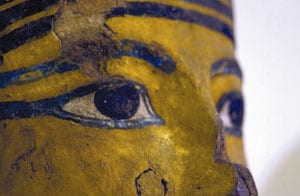Unrolling Egypt’s ancient dead
By Katherine Aitchison, on 4 April 2012
 “I have to start with a warning. There will be pictures of mummies.”
“I have to start with a warning. There will be pictures of mummies.”
Apparently the last speaker in the Petrie Museum’s programme of events for this term, John Johnston (UCL Institute of Archaeology), had been told that he was best off warning his audiences about what they were about to see. Although what people expect to see at a talk entitled “Unrolling Egypt’s Ancient Dead,” I’m not quite sure.
In case (like me) you’re unaware of “mummy unrolling”, let me explain. The term refers to a popular fad in the 19th century in which wealthy members of society would purchase an Egyptian mummy and have a grand unveiling in which they opened the bandages to see what was underneath.
This was an integral part of the “Egyptomania” that gripped Britain from around 1798 to the 1900s. If this idea isn’t disturbing enough for you, we also heard tales of French and English monarchs who took potions of mummy or used mummy as an ingredient in lotion to make them ‘pharaoh-like’.
And the most unsettling tale? How about the one about a British paint company that in 1968 regretfully announced that they would no longer be producing a shade of brown paint because it had run out of the key ingredient – powdered mummy.
 Close
Close



